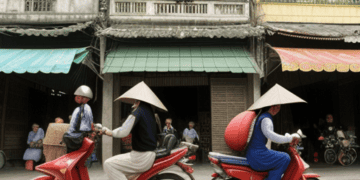HANOI — A symposium in Hanoi on Wednesday highlighted the importance of adopting international standards and securing Halal certification as essential steps for Vietnam to tap into the global Halal market effectively. The event, which focused on strategies for sustainable integration into the Halal economy, saw Hà Minh Hiệp, acting Director General of the Directorate for Standards, Metrology and Quality of Vietnam (STAMEQ), outlining the government’s initiative to foster ties with Muslim-majority countries through the Halal industry. The initiative, announced by the Vietnamese Prime Minister on February 14, 2023, aims to “Enhance International Cooperation to Build and Develop Vietnam’s Halal Industry by 2030”.
STAMEQ, alongside the Vietnam Certification Centre (QUACERT), is at the forefront of developing Vietnam-specific Halal standards, seeking global recognition for these certifications, especially in collaboration with international partners like Malaysia. This global endorsement is crucial for Vietnamese producers and exporters aiming to enter the rapidly growing Halal market. Halal certification, which confirms compliance with Islamic law, is a voluntary process evaluated by independent bodies to assure Muslim consumers of the product’s Halal status. It encompasses inspection, auditing, and verification of ingredients, processes, and facilities, including Halal labeling and marketing.
The global Halal market, serving over 1.9 billion Muslims, is projected to reach a value of US$5 trillion by 2030. The Halal food segment alone surged to $1.5 trillion in 2023, with expectations to grow to $2.58 trillion by 2027, marking a significant compound annual growth rate (CAGR). Professor Dr. Đinh Công Hoàng from the Institute of African and Middle Eastern Studies expanded on the Halal concept, noting its application beyond food to include healthcare, cosmetics, tourism, and fashion. This broader ethical and transparent approach significantly influences global consumer trends. Hoàng identified Vietnam’s advantages, such as geographical proximity to key Halal markets and a wealth of Halal-friendly commodities, as leverage points for capturing market share. However, challenges like limited Halal awareness among Vietnamese businesses and the complexity of Halal certification processes pose hurdles to market entry.
To overcome these obstacles, Hoàng suggests developing a comprehensive Halal ecosystem in Vietnam, encompassing production, services, logistics, finance, and infrastructure. He also advocates for economic diplomacy with Muslim-majority nations and leveraging regional free trade agreements to enhance Vietnam’s presence in the Halal market. Echoing these sentiments, Dato’s Tan Yang Thai, Malaysia’s Ambassador to Vietnam, emphasized the importance of understanding Halal principles, not only from a religious standpoint but also for hygiene and safety, under the “halalan-toyibban” practice.
To support Vietnamese businesses navigating Halal certification, STAMEQ plans to launch the National Halal Certification Centre, offering certification services and training on Halal standards. This move, along with the development of national Halal standards aligned with international norms, is part of Vietnam’s strategic efforts to position itself as a competitive player in the global Halal market. Vietnam has already established five national TCVN standards in the Halal domain, covering general requirements and practices across agriculture, animal feed, food processing, and conformity assessment, aiming to align with international Halal standards and practices.
Stay current with supply chain report news at The Supply Chain Report. For international trade resources, visit ADAMftd.com.
#HalalCertification #GlobalHalalMarket #VietnamHalalIndustry #SustainableIntegration #InternationalStandards #HalalEconomy #MuslimConsumerTrends #TradeAndEconomy #FoodAndBeverage #VietnameseExports















